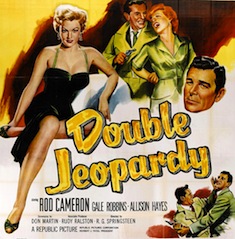 There are few more hallowed legal principles than the protection against double jeopardy, which is enshrined in various constitutions and codes throughout the world. But as allegedly unimpeachable DNA evidence has become more common in courtrooms, a backlash has developed against the centuries-old prohibition against trying a person again after they’ve been acquitted. In Scotland, for example, a new bill has allowed for the retrial of certain suspects if very strong evidence comes to light after an acquittal. And now there’s a serious reform movement afoot Down Under, too:
There are few more hallowed legal principles than the protection against double jeopardy, which is enshrined in various constitutions and codes throughout the world. But as allegedly unimpeachable DNA evidence has become more common in courtrooms, a backlash has developed against the centuries-old prohibition against trying a person again after they’ve been acquitted. In Scotland, for example, a new bill has allowed for the retrial of certain suspects if very strong evidence comes to light after an acquittal. And now there’s a serious reform movement afoot Down Under, too:
The father of one of the victims of the Walsh Street police killings has backed the Victorian government changing the state’s double jeopardy laws.
Frank Eyre, the father of Damian Eyre who was gunned down in 1988 along with colleague Steven Tynan, said he supported changing double jeopardy rules, which prevent acquitted suspects from being retried for the same crime.
According to reports one of the four people acquitted of the Walsh Street killings, Peter John McEvoy, allegedly told police in NSW that the sweetest thing he ever heard was the dying words of one of the young constables…
The coalition government pledged during the November election campaign to shake up double jeopardy rules, with legislation expected to be introduced to parliament before the end of this year.
The legislation will open the way for retrials when there is new and compelling evidence that a person acquitted of a serious crime was in fact guilty.
Attorney-General Robert Clark has said the Walsh Street killings could be one of the cases where a retrial is possible.
I understand the urge to chip away at the double-jeopardy ban, but it makes me pretty uneasy. True, the Founding Fathers and other long-ago lawgivers couldn’t have foreseen how DNA would alter the criminal-justice process. It must be horrific for the families of murder victims to learn years later that some scrap of skin or hair finally nails an acquitted suspect.
But if the ban is scrapped in part, how do we ensure that governments play fair? Double jeopardy was initially done away with because the people didn’t trust their rulers to pursue each case honestly—there was always the fear that on the second attempt, a prosecutor might magically discover some piece of evidence that had previously escaped his attention. Are we at the point where we no longer think that such misconduct is possible?
And perhaps more important, is our faith in scientific evidence a bit too total? My longform take on that issue can be read here. Suffice to say, I think any technology operated by humans is subject to error—and that’s doubly the case when the analysis comes from only one source (that is, from the prosecution). Such evidence needs to be given the most serious consideration at trial, of course, but is it such a gamechanger that it justifies the upending of roughly 900 years of legal tradition? Legislators must ponder that question very carefully.


Jordan // Jun 22, 2011 at 11:06 am
It’s another one of those slippery slope arguments, but once you open the door for a second trial, there’s always going to be a temptation to keep going. A trial is a pretty expensive process, in terms of money, time and emotional reserves.
Additionally, our legal system is supposed to be weighted towards letting guilty people go rather than punishing the innocent. Seems like we’re not too good at that lately, but theoretically that’s how it’s supposed to work.
Brendan I. Koerner // Jun 22, 2011 at 8:26 pm
@Jordan: Good points, all. What raises a red flag for me is the insistence of the reformists that they’ll only do this in extreme cases–when there is indisputable proof of guilt. But isn’t a trial supposed to determine, rather than the assumptions of the prosecutors?